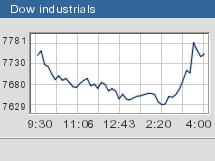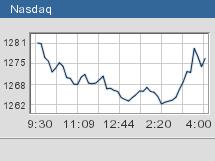NEW YORK (CNN/Money) -
Fears of a possible war with Iraq and threats of terrorism against Americans led stocks to their third straight day of declines Thursday and were likely to remain in focus heading into the last trading session of the week.
A technical rally in the last hour of trading helped the Dow regain about 100 points lost earlier in the day. Traders said key support levels hit by the S&P 500 index were the reason for the late uptick. But despite the bounce, the market finished the day in the red.
"There are so many clouds over the market. I don't see any short-term way out of this mess," said Jack Baker, head of equities at Putnam Lovell Securities. "Some people are calling for not only a test of the October lows, but for possibly falling below the October lows once we start shooting."
The Dow Jones industrial average (down 8.30 to 7749.87, Charts) and the Nasdaq composite (down 1.53 to 1277.44, Charts) closed down about 0.1 percent, while the S&P 500 index (down 1.31 to 817.37, Charts) slipped 0.2 percent. All three indexes came off their lows in the last minutes of trading, but losses for the day pushed the major markets one step closer to their five-year lows reached last October. Stocks have seen declines in seven out of the past eight session.

After four weeks of declines, the market was still within range to end this one higher. The Dow was down about 115 points so far this week at the close Thursday, while the Nasdaq lost 5 points and the S&P trailed by about 12 points.
Wall Street once again shrugged off modestly encouraging economic news, which included a January retail sales report that was stronger than expected when auto sales were excluded. A drop in the number of people filing for unemployment benefits last week also failed to provide much support for the stock market in the early going.
The Commerce Department said retail sales in January fell 0.9 percent, compared with a 2 percent rise in December, but rose 1.3 percent excluding weak auto sales for the month. Economists, on average, had expected sales to slip 0.6 percent, but to rise only 0.5 percent excluding the auto sector, according to Briefing.com.
The Labor Department said Americans filed 389,000 new forms for unemployment benefits in the week ended Feb. 8, compared with 391,000 the preceding week. Wall Street expected a decline to 390,000.
"Decent economic news is being ignored. The market seems to be paralyzed by Iraq and terrorism -- it's just a mess," said Donald Selkin, director of research at Joseph Stevens. "In another time, the [economic numbers] might have caused a rally or some kind of stability."
Economists said these reports, coupled with a decent Institute of Supply Management manufacturing index and a better factory orders report last week, along with signs that corporate earnings for the fourth quarter have risen 11 percent so far, could be indications that the economy was stabilizing outside of the Middle East tensions.
But, instead of looking for signs of improvement in the economy at home, traders chose to focus on the other major concern that has plagued the market for months: a potential war with Iraq.
Investors were reluctant to put money into stocks ahead of Friday's update from U.N. weapons inspectors on their findings in the country, especially after it was revealed that Baghdad has a missile that exceeds the range mandated by the United Nations.
Traders were mixed on whether the market might be able to eke out gains Friday, ahead of the holiday weekend. But, some good news from Dell Computer that came in after the bell Thursday could help lift markets in the morning hours.
Dell (DELL: up $0.31 to $23.25, Research, Estimates) posted fourth-quarter earnings of 23 cents a share, up from 17 cents in the year-earlier period, that met Wall Street forecasts. The No. 2 personal computer maker also forecasted it would meet first-quarter estimates. Shares of the company rose 2 percent in after-hours trading. Some analysts had predicted that Dell would lower its forecasts for upcoming quarters.
Before the opening bell Friday, investors get another dose of economic data. The government plans to release a report on business inventories for December, which economists expect to have risen 0.2 percent, equal to gains made in the previous month.
Separately, the Labor Department is scheduled to release data on industrial production for January. A consensus of economists surveyed by Briefing.com expected a rise of 0.3 percent compared with a drop of 0.2 percent in December.
Just after the markets open, investors will get a preliminary reading on consumer sentiment. Economists predict the index from the University of Michigan will decline to 81.9 in February from a reading of 82.4 in January.
"We have the consumer confidence report tomorrow," said Selkin. "I don't see how that's going to be any good. I would consider it a victory if we get (a reading) of 82."
War talk remains focus
Taking the Bush administration's war campaign to Capitol Hill Thursday, Defense Secretary Donald Rumsfeld told the Senate Armed Services Committee that U.S. troops will stay in Iraq "as long as is necessary" after a potential war has been fought and won by the United States, in order to disarm the country and put in the foundation for a stable government.

Joint Chiefs of Staff Chairman Gen. Richard B. Myers also addressed the committee, saying NATO was considering ways to provide assistance to Turkey without political approval. Germany, Belgium and France have blocked an initiative to protect that country in the event of war against its southern neighbor.
Secretary of State Colin Powell, meanwhile, appeared before the House Budget Committee for the third consecutive day, saying the chief inspectors' report to the United Nations Friday would provide a jumping-off point for discussions on how to disarm Iraq.
The Pentagon announced that it had met the goal of moving 150,000 troops within striking distance of Iraq by mid-February. President Bush, upping the war rhetoric, told naval troops at the Mayport Naval Air Station in Jacksonville, Fla., that America has an obligation to protect itself and its allies from terrorists and outlaw nations.
All of this came amid raised concerns that a terrorist attack against the United States could be imminent, caused by a raised terror threat alert last week, combined with a taped message purportedly from al Qaeda leader Osama bin Laden released Tuesday and a government urging for Americans to stock up on duct tape and water. (Full coverage of the latest news or Iraq and the terrorist threat is available at CNN.com.)
At the same time, a revelation by CIA Director George Tenet that North Korea has missiles that could reach U.S. territory added its own weight to Wall Street's mounting concerns.
This tense global political climate has led to a process of slow declines on Wall Street, leaving stocks very near their October lows, as money slowly seeps out of the market. Most recent trading sessions have been characterized by low volume and moderate declines in prices across the board.
"It's like a vicious cycle," Putnam Lovell's Baker said. "How the hell could you turn around and be a buyer with all of this stuff going on?"
Retailers lead corporate news
Thursday was no different, especially amid a dearth of corporate news. Dow member McDonald's (MCD: down $0.26 to $13.57, Research, Estimates) shed almost 2 percent of its value after the fast-food retailer said same-store sales fell 2.4 percent in January, due to weakness in its European, Asian-Pacific and Canadian markets.
Several clothing retailers pulled the sector lower after they were downgraded. UBS Warburg cut its investment ratings on clothing chains Pacific Sunwear (PSUN: down $0.34 to $17.08, Research, Estimates), Gap (GPS: down $0.50 to $14.68, Research, Estimates) and Limited Brands (LTD: down $0.20 to $11.30, Research, Estimates) to "neutral" from "buy."
Market breadth was negative as decliners outnumbered advancers by 10 to 7 on both the New York Stock Exchange and the Nasdaq. Some 1.4 billion shares traded on the NYSE and 1.3 billion shares were traded on the Nasdaq.
Bonds rose as equities fell, with the yield on the benchmark 10-year note at 3.87 percent, down from 3.91 late Wednesday . The dollar lost ground against both the euro and the yen.
In key commodities markets, light crude oil for April delivery gained 64 cents to trade at $35.18 a barrel, trading near a two-year high as the war talk continued and U.S. stockpiles dwindled to 27-year lows. Gold for April delivery rallied $4.70 to $357.70 an ounce in New York.
European stocks and Asian-Pacific stocks mostly ended lower Thursday on worries over Iraq and North Korea.

|

